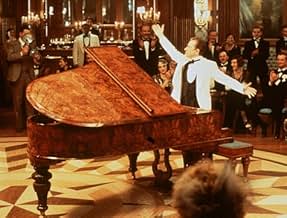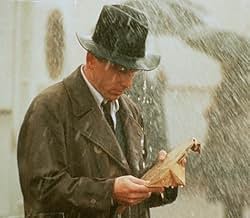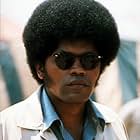A baby boy discovered on an ocean liner in 1900 grows into a musical prodigy, never setting foot on land.A baby boy discovered on an ocean liner in 1900 grows into a musical prodigy, never setting foot on land.A baby boy discovered on an ocean liner in 1900 grows into a musical prodigy, never setting foot on land.
- Awards
- 22 wins & 10 nominations total
- Machinista messicano
- (as Alberto Vázquez)
- Director
- Writers
- All cast & crew
- Production, box office & more at IMDbPro
Storyline
Did you know
- GoofsThe recording equipment used for making the record was clearly acoustic in nature, showing large horns. This type of recording was largely replaced in 1925 by electrical recording, using microphones. Yet the recording was made somewhere between 1927 and 1933, according to Tooney's story. Furthermore, the recording engineer played back the matrix immediately; this would have ruined the matrix, which was cut in wax. In those days, immediate playback was only possible using a second set of equipment especially for that purpose.
- Quotes
1900: [explaining why he didn't leave the ship and never will be] All that city... You just couldn't see an end to it. The end! Please, could you show me where it ends? It was all very fine on that gangway and I was grand, too, in my overcoat. I cut quite a figure and I had no doubts about getting off. Guaranteed. That wasn't a problem. It wasn't what I saw that stopped me, Max. It was what I didn't see. Can you understand that? What I didn't see. In all that sprawling city, there was everything except an end. There was everything. But there wasn't an end. What I couldn't see was where all that came to an end. The end of the world. Take a piano. The keys begin, the keys end. You know there are 88 of them and no-one can tell you differently. They are not infinite, you are infinite. And on those 88 keys the music that you can make is infinite. I like that. That I can live by. But you get me up on that gangway and roll out a keyboard with millions of keys, and that's the truth, there's no end to them, that keyboard is infinite. But if that keyboard is infinite there's no music you can play. You're sitting on the wrong bench. That's God's piano. Christ, did you see the streets? There were thousands of them! How do you choose just one? One woman, one house, one piece of land to call your own, one landscape to look at, one way to die. All that world weighing down on you without you knowing where it ends. Aren't you scared of just breaking apart just thinking about it, the enormity of living in it? I was born on this ship. The world passed me by, but two thousand people at a time. And there were wishes here, but never more than could fit on a ship, between prow and stern. You played out your happiness on a piano that was not infinite. I learned to live that way. Land is a ship too big for me. It's a woman too beautiful. It's a voyage too long. Perfume too strong. It's music I don't know how to make. I can't get off this ship. At best, I can step off my life. After all, it's as though I never existed. You're the exception, Max. You're the only one who knows that I'm here. You're a minority. You'd better get used to it. Forgive me, my friend. But I'm not getting off.
- Alternate versionsOriginal version released in Italy is 2 hours and 45 minutes long. A 123-minutes version premiered at the Locarno film Festival in July 1999. This shorter version is the same released in the USA by Fine Line under the title "The Legend of 1900".
- ConnectionsEdited into Catalogue of Ships (2008)
- SoundtracksBig Fat Ham
Written by Ferdinand 'Jelly Roll' Morton (uncredited)
Performed by Ferdinand 'Jelly Roll' Morton (as 'Jelly Roll' Morton)
Edizioni Chappell s.r.l
What they all have in common, besides beautiful cinematography, is that they try, quietly and modestly but nevertheless ambitiously, to investigate some aspects of the very essence of the human soul. The emotion used by many such movies, especially the ones directed by Tornatore, is nostalgia: by understanding the pain of irrecoverable loss we are supposed to understand what we truly needed. These movies express perfectly HL Mencken's definition of the artist as "one who observes the eternal tragedy of man with full sympathy and understanding, and yet with a touch of god-like remoteness."
However, for reasons I fail to understand, the unavoidable sentimentality of these movies bothers many critics and casual viewers to no end. It's true that sentimental art exposes itself the most to irony and cynicism, but it is nevertheless disappointing to see many critics taking advantage of its vulnerability and indulging in hitting hard and hitting low against such movies. No wonder that art in general, not only movies, is nowadays almost devoid of sentimentality. Artists choose to clad themselves in critic-proof armors of irony and sophistication. Honesty has long become a dangerous no-win proposition.
So I say 'Bravo!' to Tornatore for having the courage to give us some bullshit-free insight into ourselves by showing us what moves us and why. I also say 'Boo!' to the critics who don't get it, and who mistake their expectations and biases for some kind of objective artistic standard.
Details
- Release date
- Country of origin
- Languages
- Also known as
- La leggenda del pianista sull'oceano
- Filming locations
- Production companies
- See more company credits at IMDbPro
Box office
- Budget
- $9,000,000 (estimated)
- Gross US & Canada
- $167,435
- Opening weekend US & Canada
- $39,200
- Oct 31, 1999
- Gross worldwide
- $21,061,339
- Runtime2 hours 49 minutes
- Color
- Sound mix
- Aspect ratio
- 2.35 : 1
Contribute to this page




















